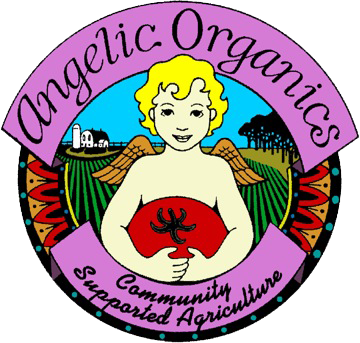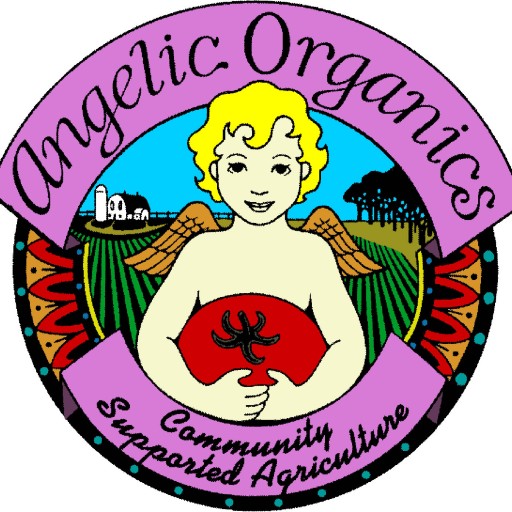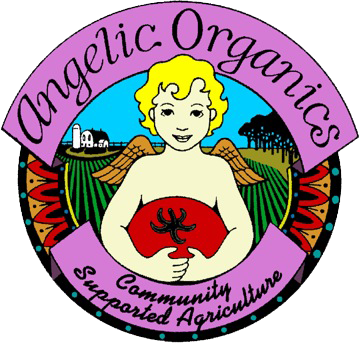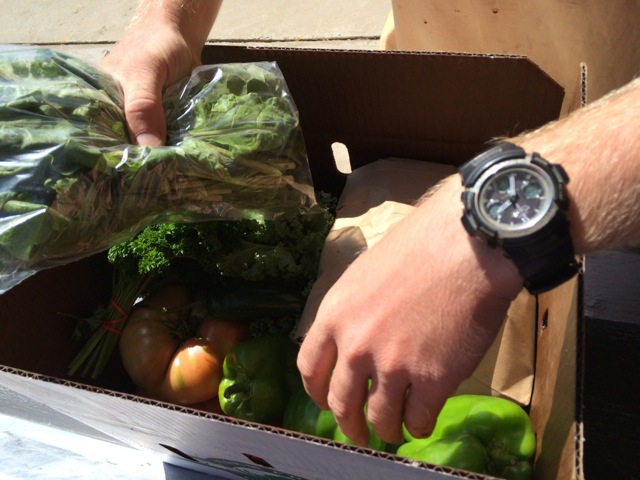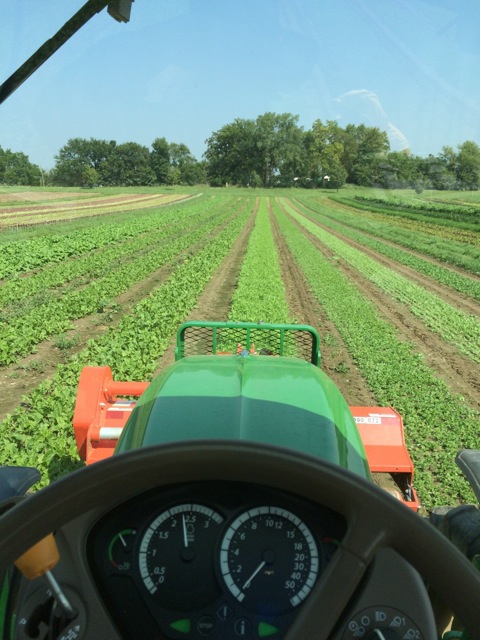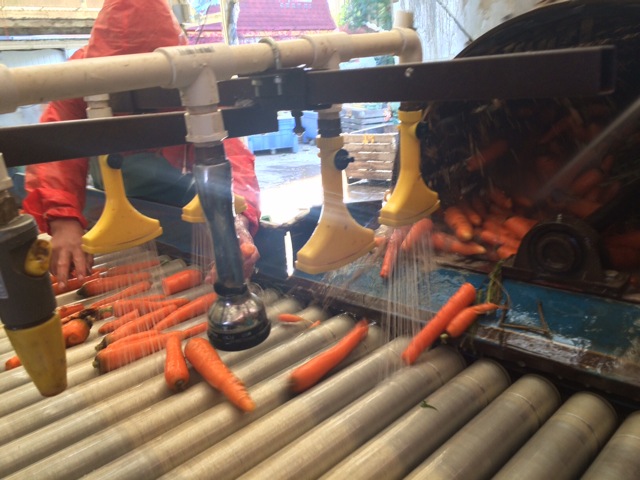Farmer John Writes: Once We had Interns
Welcome to our Nineteenth Harvest Week
Please Flatten Your Boxes Properly and Return Them, Especially if You have been Stockpiling Them
The farm re-uses the vegetable boxes. Flaps are easily torn when the boxes are dismantled improperly, and then the box bottom might later burst open with fresh, organic local produce heading towards the floor. Please flatten your box carefully. Return your empty, flattened vegetable box to your delivery site. If you receive home delivery, place your box(es) in the location where your box is delivered. If you receive fruit, you’ll need to re-cycle your fruit box on your own, as the farm does not re-use your fruit boxes.
This Week, Week 19, May be Your Last Week
For those of you who have a half share, but not an extended season share, this is your final week. Thank you for being with us this year. We hope you enjoyed the season.
Next Week, Week 20
Next week, we are going to put a 2016 signup form in your box. I realize that not every one of our shareholders reads their emails or even the newsletter, so I am sure that many of our shareholders do not know that we have been offering shares for next year. (Of course, if you are reading this now, you most likely know that we have been offering 2016 shares for a while, but, trust me, not every shareholder knows this.) I have mentioned that CSA farms are having increasing difficulty selling shares today, so I like to garner as many 2016 commitments as possible while our vibrant 2015 season is still running.
Let’s be Clubby
I don’t like marketing. Marketing is not why I decided to get the farm going again back in 1990. Once we got over some hurdles in the 90’s, we hardly marketed at all for many years. Now I have to market again, because there are so many options for getting organic vegetables today. If you like our CSA program, please let your friends know. And let them know that the only way they can have their Very Own Farm is to join a CSA.
More or Less
If I cut back on share sales, I would have to market less. I am considering this option for 2016.
Dr. Mercola Loves Your Farm and The Real Dirt on Farmer John
http://articles.mercola.com/sites/articles/archive/2015/10/03/organic-farming-benefits.aspx
Greens
Last week, some of our shareholders noted that we overdid their box with greens. I agree. We try to make the box more balanced, but the leaves on our choi heads were starting to tatter and the Chinese cabbage was ready to harvest, so I reluctantly agreed to harvest both of these items, and that skewed the box composition. I suspect that some of our shareholders liked the box contents anyway—or maybe even especially liked the box contents–but normally, I wouldn’t create a box so slanted towards greens. It’s the way farming goes some times. We’re not a hardware store or Amazon, where you can get whatever you want at pretty much any time. We are one farm, and that is part of the adventure of being our shareholder: your weekly box represents how the season overall has converged to provide you with your vegetables that week. It’s the ultimate in eating local.
Angelic Organics and Interns
Interns are a right of passage on many farms. A farmer will go…hmm….there’s a lot of work to do. I don’t have any money. Solution…I’ll have interns!
So, Angelic Organics had interns in its beginning years as a CSA farm.
Interns created a second, full-fledged program at our farm. The one program was production; the other was residential life. The residential life component added a dimension similar to summer camp, except that the interns didn’t pay to come to our farm; we actually paid them, just not as much as we would have paid them if they had been hourly workers. The idea was that they would get paid with a stipend, room, board, and some training in how to grow organic vegetables.
This training of interns in how to grow organic vegetables was a challenge, because I was just getting the knack for how to do this myself. (For more on my learning curve, see The Real Dirt on Farmer John, where you will hear me say, surrounded by rotting butternut squash, “we had just about every kind of scourge that the Bible mentions, and then some.”) So, I really didn’t qualify to teach interns, plus, I didn’t have time to teach them, because I was already scrambling for about 110 hours every week to (partially) fill our CSA boxes. (Now I only work 80 or 90 hours per week.)
So, for the first several years of our CSA, we ran an unofficial residential program. It was challenging in many ways. We fed the interns, but their food preferences were so specific, it was almost like we needed a private chef for each intern—no sugar, some sugar, only maple syrup for a sweetener…no meat of any kind, no red meat, no nightshades, lots of nightshades…never, ever caffeine…never dairy…no chocolate…I’d like more and better coffee….I’m vegan and I smoke…I’m macrobiotic…
You have most likely heard, perhaps you have even claimed, that most young people today do not know how to work hard. Of course, some of our interns worked very hard, but many thought they were working really hard, but by a farmer’s standards, they weren’t.
One year, we had a group of interns who were horrified by the size of our CSA. We were maybe 20% the size then that we are now. What got them going down this path of indignation was their visit to a heavily subsidized farm where the training was thorough; the work was hands-on, not mechanized; efficiency and overall productivity were not highly valued. Oh, and the interns on that farm paid to be there.
I came upon our five interns huddled in the yard late one afternoon and one of them said, “this place is crazy. It’s really not human. We are designing the perfect CSA. All five of us are going to run it. It’s only going to sell one share per farm worker. Our CSA will be the right scale, not like this farm.”
At the time—20 years ago—our shares sold for about $400 each. I said, “that will be $400 per year for each of you, before the expenses of producing your share. How are you going to make that work?”
“That farm we just visited knows how to balance work with the needs of its interns properly. If they can do it, we can do it.”
“Well, that farm gets major subsidies from a trust fund. This farm doesn’t have that.”
“If they can make it work, so can we. We were even considering selling an extra share to make it work. We are deciding now if the five of us will produce a sixth share. The way it is now, we don’t even have time to clean the house, we work so hard.”
“Why don’t you clean it on weekends?”
“We are so exhausted on weekends. It’s simply not possible for us to do it then.”
“Yes,” chimed in another of the interns. “We need time to clean our house.”
They were all chiming in about their messy house…”filthy…no time…working way too hard…”
“Okay, you guys, here’s what I’ll do. I’ll give you Thursday afternoons to clean your house,” I offered reluctantly.
After that talk, I did not see much of the interns on Thursday afternoons. I was happy they were getting their house cleaned.
A few weeks later, I checked in with the interns. “How is it now that your house is clean?”
“Oh, we haven’t started cleaning yet.”
“Haven’t started cleaning yet?! What have you been doing with your free afternoon?”
“We’ve been deciding what’s fair.”
“Fair?”
“Yes, some of us like doing certain housecleaning things better than other housecleaning things. We are developing a point system.”
“Points?”
“Yes, everyone is deciding exactly how much they like which job. If a person really dislikes a job, such as cleaning the toilet, that person gets 10 points to do that job. If the person really likes a job, such as sweeping the floor, he or she will get one point for it. A person will have done their share of cleaning when they reach a certain number of points. We have not decided yet what that number should be.”
“You mean you have been over there all these Thursday afternoons, meeting about how to clean the house and not cleaning it?”
“Yes, we have to get it all decided first. And we’ve only begun recently to consider the point system for the support person who is there for the person who is doing a job worth ten points. Let’s say that one of us hates cleaning the refrigerator, but decides to sign up for cleaning the refrigerator one week. That’s ten points for that person, but it’s not fair to have someone doing a ten point job. This is where the support person comes in. The support person will comfort the person doing the ten point job in any way the person doing the unappealing job asks. It could be just sitting there and observing. It could be discussing the unpleasantness of the task. It could be telling a story that takes the person’s attention away from the unpleasant task, or maybe singing to the person.”
The intern continued, “but there is a problem which we haven’t ironed out yet, which is how many points the support person will get for supporting the person doing the work. Some of us like being a support person, but some of us don’t. Plus, there are certain kinds of support that a person enjoys giving more than other kinds of support, so supporting a person cleaning the refrigerator might lead to more points or fewer points for that support person than supporting a person who is washing the dishes.”
“Also, when a person is doing a ten point job, and has a support person, it might make the person doing that job decide that that job, because of the support, really only deserves eight points. We are trying to figure out if we need a system for reducing points if the person doing the job finds the job less offensive if he or she has good support.”
“How soon before you are going to start cleaning the house? The season ends in two months.”
“It depends on how soon we are comfortable with our point system. It has to be fair.”
Let us Know
Let Shelly know anything you’d like to share about this week’s box email hidden; JavaScript is required. Please note the week and day of delivery, your site, when you picked up your box, and any comments about your box.
More from Shareholders
Visit us often at www.facebook.com/angelicorganics , where we post exciting farm developments regularly, and shareholders post recipes, tips, and photos.
Saturday’s Box Contents
Please Note: this summary is written before you receive your box—be aware that some guesswork is involved. What we think we’ll put in your box might not actually end up in your box. As always, be sure to thoroughly wash all of your vegetables, and remember to sort through your baby greens to eliminate any discolored leaves or weeds.
Salad Greens – lettuce
Fruiting Crops – hot peppers, maybe winter squash
Cooking Greens – kale
Brassicas – Brussels sprouts, broccoli, maybe cauliflower
Alliums – onions, leeks
Root Crops – maybe daikon radishes
Herbs – dill
Your Farmer, John
